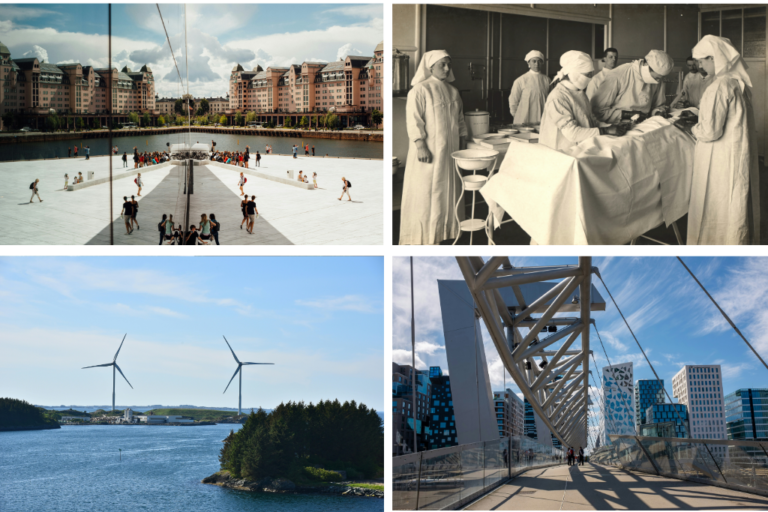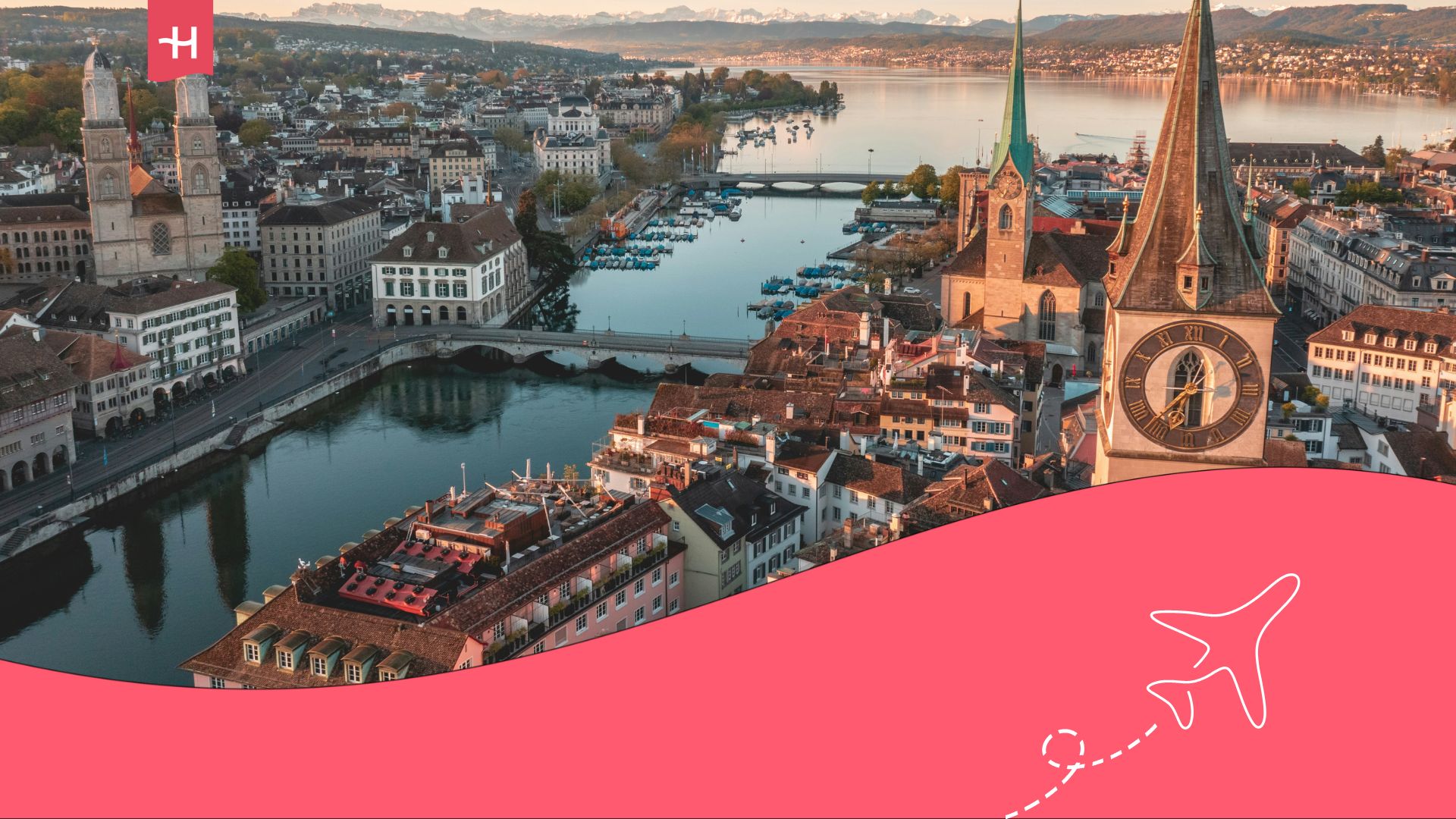Work in Norway: Requirements and opportunities
Work in Norway: requirements, in-demand jobs, salaries, and how to find a job as a foreigner.
Working in Norway is becoming increasingly appealing and can be a very good decision. Whether for its beautiful landscapes, high quality of life, or excellent work conditions, this country offers many advantages if you seek professional experience abroad.
If you are considering working in Norway, it is important to know the steps to follow: From requirements for a work permit to the most common opportunities for foreigners. In this article, we clearly and simply explain everything you need to know to start your professional journey in this country.
Advantages of working in Norway
Working in Norway can be a transformative experience, both professionally and personally. This Nordic country not only offers high salaries and economic stability, but also enviable quality of life, with safe cities, nature nearby, and an excellent work-life balance.
Although its tax system may seem high at first glance, the benefits, such as: Public healthcare, education, and social security, make it truly worthwhile. Norway also has an active international community, making adaptation easier, especially if you speak English. If you are seeking a place to grow professionally and enjoy a calm and orderly life, Norway gives many reasons to consider it:
- High income: Salaries in Norway are generally very good. Even for basic or unskilled jobs, wages are often higher than in many other countries. This allows you to live comfortably and enjoy some treats.
- Economic stability: The Norwegian job market is quite stable. Laws protect workers well, and the work culture values balance between work and personal life. The economy is solid, providing long-term security.
- Safety in every sense: Norway is one of the safest countries in the world. Crime rates are low, and you can walk safely even at night. It also has an efficient public healthcare system and social services to support you if needed.
- High quality of life: Living in Norway means enjoying fresh air, abundant nature, and well-organised cities. You have access to good education, quality public services, and a calm lifestyle, especially if you come from chaotic places.
- Active international community: Although Norwegian is the official language, many people speak English, especially in big cities like Oslo, Bergen, and Trondheim. There is also a growing international community, easing adaptation and allowing friendships worldwide.
- Respect for work-life balance: Staying late at the office is frowned upon. Typically, the working day ends early so you can enjoy life outside work. Holidays are generous, with at least five weeks annually.
- Social security and state support: Norway has a solid welfare system. This means workers (and often residents) can access public services like healthcare, unemployment benefits, pensions, and financial support in difficult times.
Requirements to work in Norway
Working in Norway is not impossible, but certain requirements must be met. It depends on your country of origin, profession, and intended stay. Here’s a clear explanation of the essentials:
- Have a residence permit with work rights: Non-EU citizens, like many Latin Americans, need a work residence permit. The Norwegian Directorate of Immigration (UDI) issues it, and you must apply before entering Norway, with few exceptions. You need a concrete job offer from a Norwegian company, relevant to your studies or work experience, a salary within the Norwegian legal minimum for that job, and to meet any educational or professional training requirements if applicable.
- If you are an EU or EEA citizen: You can travel and work without a visa, but must register in Norway if staying over three months. A job offer is still required to establish residency legally.
- Speak English (and ideally some Norwegian): Perfect Norwegian isn’t required initially, especially in international roles or tech, engineering, or tourism. But English is almost mandatory, and some Norwegian opens many more doors, especially in public service or healthcare.
- Keep documentation up to date: You need a valid passport, copies of degrees or certificates (in English or Norwegian translation), and the signed job offer letter. Regulated professions (nursing, teaching, architecture) may require title validation in Norway.
- Show residence and finances initially: When applying for the permit, provide your Norwegian address and demonstrate sufficient income for living expenses, even if you already have a job.
Tips to start working in Norway
Starting your work adventure in Norway can be as exciting as it is challenging. New customs, unfamiliar procedures, and the need to adapt quickly may raise many questions. But don’t worry, feeling this way initially is normal. With organisation, a positive attitude, and the right resources, the path becomes much easier.
To help you, we’ve prepared a practical list of tips that make your arrival and first steps in the Norwegian job market much smoother:

- 1. Keep your documents up to date: Before travelling to Norway, prepare your valid passport, work or residence permit (if non-EU/EEA), CV in English or Norwegian, translated diplomas and certificates. Store everything digitally in the cloud (Google Drive, Dropbox…). It will save you if you don’t have physical copies.
- 2. Adapt your CV to Norwegian style: The Norwegian CV is simple, honest, and direct: No photo, clear chronology, focus on skills and experience, brief personalised cover letter. You can find templates on portals like Jobbnorge.no or NAV.no.
- 3. Learn basic Norwegian: Many jobs allow English, but knowing Norwegian greatly expands your opportunities, especially in healthcare, education, customer service, and public sectors. Start with apps like Duolingo or free courses in your Norwegian city. Some municipalities offer classes for new immigrants.
- 4. Arrange temporary accommodation initially: If you have no permanent residence yet, opt for temporary stays. Useful platforms: Finn.no, Hybel.no, Airbnb, or colivings if you travel alone. Ideally, live near train or bus stations until you know the city.
- 5. Ensure medical coverage: Once registered and legally working, you access the public health system automatically. Meanwhile, a temporary medical insurance is useful if job hunting or without formal residence.
- 6. Have internet from day one: You’ll need it to check directions, reply to interview emails, use maps, or translate texts. Holafly is an excellent option for internet upon arrival. For short-term work, Holafly’s eSIM for Norway is ideal.
- 7. Ensure medical coverage: Once registered and legally working, you access the public health system automatically. In the meantime, temporary health insurance can be useful if job hunting or without formal residence.
Types of jobs in Norway for foreigners
Working in Norway as a foreigner is entirely possible, and more people are achieving it thanks to the variety of sectors open to international talent. Whether you have technical experience, speak only English, or are learning Norwegian, real opportunities exist.
Not all jobs require the same skills. Some value practical experience, others need validated degrees or language proficiency. To help, we’ve prepared a table with accessible sectors, common positions, and main requirements, so you can focus your job search effectively.
| Sector | Position | Main features |
|---|---|---|
| Construction and trades | Carpenter, electrician, plumber, welder | Practical experience valued. Many accept basic English. Some require technical certification. |
| Cleaning & maintenance | Office cleaning, hotel cleaning, building maintenance, industrial cleaning | No advanced training required. Good for entry-level. Flexible hours. Language not always needed. |
| Hospitality & gastronomy | Cook, waiter/waitress, kitchen assistant, barista | Ideal in tourist areas. English usually enough. Temporary or seasonal positions. |
| Logistics & transport | Delivery driver, truck driver (CE licence), warehouse worker | Physical work. Punctuality and responsibility valued. Licences must be valid in Norway. |
Healthcare | Nurse, doctor, physiotherapist, nursing assistant | High demand. Requires degree validation and B1-B2 Norwegian. Competitive salaries. |
| Technology (IT) | Software developer, data analyst, IT specialist, technical support | One of the most open sectors to international talent. Fluent English usually sufficient. |
| Education & childcare | Teacher, preschool educator (barnehage), teaching assistant | Requires degree validation and good Norwegian. High demand in public schools and nurseries. |
| Tourism & customer service | Tour guide, receptionist, travel agent, call centre | Multiple languages valued. English minimum required. Seasonal contracts common. |
Jobs in highest demand in Norway for foreigners
If you’re considering working in Norway, there’s good news: The country has a high demand for workers in key sectors, many of which welcome foreigners. From construction and cleaning to technology and healthcare, Norway needs talent in diverse areas. Some roles require specific training or degree validation, while others are more accessible and serve as an excellent entry point to the job market.

Here are the main jobs currently most sought after, with brief descriptions to help you identify which best fits your profile and plans:
- Healthcare specialists: More than just job openings, these are urgent needs. Authorities seek committed professionals ready to integrate long-term. If you come from the health sector, real opportunities exist to build a solid and well-paid career.
- Technical construction profiles: Norwegian cities keep growing, requiring skilled hands. From residential projects to public infrastructure, there is space for qualified tradespeople who solve problems efficiently and technically.
- Technology experts: The country strongly invests in innovation, reflected in constant demand for programmers, analysts, and cybersecurity specialists. Language isn’t a barrier; experience and skills are most sought after.
- Logistics and transport workforce: E-commerce growth reshapes this sector. Resolute, organised individuals who enjoy active environments are needed. If you like mobility, driving, or operational work, stable options exist.
- Gastronomy and tourism workers: Although many vacancies are temporary, they can serve as a stepping stone to settle. Norway receives increasing tourism and seeks people with initiative, positive attitude, and interpersonal skills.
- Education and childcare professionals: Norway highly values quality early education. If you have a teaching vocation and are willing to integrate into the language and culture, you can find a stable and highly regarded path.
Salaries and cost of living in Norway
Living and working in Norway is like opening a window to a calm, safe, and well-organised life, though not exactly cheap. Salaries are generally high, reflecting both the standard of living and the cost to maintain it. Although Norway lacks a national minimum wage like other countries, many sectors follow collective agreements ensuring decent conditions, especially in construction, hospitality, and cleaning. For example, an office worker may earn between €3.400-5.100 ($3,640-5,460), while a tech professional can easily surpass €5.950 ($6,360).
Although salaries are high, the cost of living is also significant. Rent, groceries, and dining out are particularly expensive compared to other European countries. However, many feel it’s worth it, as Norway offers a peaceful lifestyle, efficient services, clean air, and excellent work-life balance.
Important: If you are a frequent traveler and want to stay connected without worrying about expensive roaming or looking for a new SIM at every destination, Holafly’s subscription plans are for you. With a single eSIM, enjoy internet in more than 170 countries for a fixed price and no surprises on your bill. Travel without limits and connect easily and securely! 🚀🌍

Where to find job opportunities in Norway
Finding a job in Norway may seem challenging initially, but knowing where to look makes the process much easier. The country offers digital platforms, specialised agencies, and official resources to facilitate your path.
Here are the main ways to search for jobs in Norway:
- Digital platforms: The official government portal, NAV.no, publishes thousands of updated vacancies, many accessible to foreigners. Also check Finn.no, popular with locals, or Jobbnorge.no for public or academic sector jobs. LinkedIn is widely used by Norwegian companies and recruiters to find international talent.
- Employment agencies: Such as Adecco, Manpower, Randstad, or Kelly Services. They connect workers with employers in logistics, cleaning, construction, tech, or healthcare. Many accept applications in English, and some assist with basic paperwork.
- Government temporary postings: Seasonal jobs: Mainly in agriculture, fishing, or tourism. These appear mainly in spring and summer and are published on NAV or EURES, which compiles job offers across Europe.
- Contacts, social networks, and direct search: Networking is highly valued. A well-prepared LinkedIn profile, attending job fairs, or approaching companies directly with your CV can open doors, as many vacancies are filled through direct contacts and recommendations.
Frequently asked questions about working in Norway
Valid passport, residence or work permit (if applicable), Norwegian personal identity number (D-number or fødselsnummer), Norwegian bank account, employment contract.
It depends on the sector: In technology or tourism, English is sufficient; in health, education, or public sector jobs, Norwegian at a B1-B2 level is usually required. It’s recommended to learn some Norwegian from the beginning to integrate better.
Yes, but you need to get an official recognition through NOKUT, especially if you plan to work in regulated professions (such as health, engineering, or teaching).
A quick and practical option for the first few months is to use an eSIM from Holafly, which offers monthly plans without a contract. This allows you to have internet as soon as you arrive, without relying on WiFi.
It can be tricky at first if you don’t have a credit history or Norwegian references. The best approach is to search on portals like Finn.no and consider temporary options (like Airbnb or coliving) while you settle in.





 Language
Language 


















 No results found
No results found







